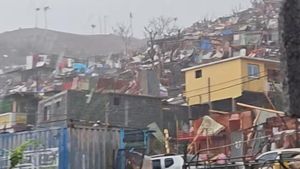Cyclone Chido has wreaked havoc on Mayotte Island, leaving destruction and despair in its wake as it struck the French overseas territory with unmatched ferocity. Residents are grappling with the aftermath of the storm, which has been termed the most powerful cyclone to hit the region in nearly 90 years.
The cyclone made landfall on Saturday night, unleashing winds exceeding 200 kilometers per hour (124 mph). According to Meteorological authorities, the storm was remarkably intense, causing significant damage to housing and public infrastructure. "The storm spared nothing. The hospital is hit, the schools are hit. Houses are totally devastated," said Ambdilwahedou Soumaila, the mayor of Mamoudzou, the island's capital.
Mathilde Hangard, a journalist with Le Journal de Mayotte, painted a grim picture of the situation live from Paris, saying, "It’s another day in hell, without water, without electricity, without network. The island is cut off from the world. Everything is destroyed, the airport, the hospital, schools." Residents describe it as apocalyptic, struggling to comprehend the scale of the disaster.
Current estimates indicate the death toll may range from hundreds to several thousand, and the precise figure remains uncertain. Prefect François-Xavier Bieuville stated on local broadcaster Mayotte La Premiere, "At least several hundred people are feared dead." Authorities are facing immense challenges, not only due to the cyclone's immediate destructive impact but also concerning the underlying social issues affecting the region. With nearly one-third of the population residing in shantytowns, vulnerable communities have borne the brunt of the hurricane's destruction.
Emergency responders are tirelessly working against the clock to reach survivors and restore basic services. The French government has deployed military and emergency aid teams, with Defense Minister Sébastien Lecornu announcing enhanced relief measures. Nicolas Daragon, France’s minister for everyday security, confirmed, "The first intervention planes arrive in Mayotte to provide emergency aid. The State is fully mobilised to support the inhabitants of Mayotte in this ordeal."
Members of the local community voiced their fears, with former nurse Ousseni Balahachi mentioning some residents avoided seeking assistance due to distrust, thinking it might lead to them being forcibly removed from the territory. Some people stayed indoors until the cyclone elicited extreme conditions; for many, it was already too late to escape.
While immediate aid has begun to flow, the task of accounting for the missing and the dead is fraught with complications. Frequent reports highlight the issue of clandestine residents, contributing to the growing anxiety over how many have been impacted by the cyclone. The local infrastructure suffered enormous setbacks, making rescue and recovery operations complex.
With the onset of international pledges to help Mayotte, including supportive messages from the Red Cross and the European Union, officials are attempting to organize supply routes and aid distributions efficiently. European Commission president Ursula von der Leyen assured, "The bloc is ready to provide support in the days to come," reflecting the collaborative global sentiment acknowledging the magnitude of this disaster.
The United Nations has also raised considerable alarms, stating, "Many homes, schools, and health facilities have been partially or completely destroyed." UNICEF stated the impending need for resources would be significant as survivors endured continued misery.
Chido’s impact went beyond Mayotte, with reports of damage across the Mozambique Channel region, where more areas experienced adverse effects as the storm moved on. The cyclone's remnants threaten to cause heavy rains and additional flooding, exacerbated by already existing vulnerabilities within the region. UNICEF's reports warned, "Around 1.7 million people are in danger" as weather patterns shift and climate change poses ever-increasing threats.
Witness accounts describe the frenetic scene, with residents like Ibrahim voicing sentiments of despair and hopelessness as they maneuver through the ruined landscapes of their former communities: "I saw entire neighborhoods disappear," he expressed, emphasizing the emotional toll as well as the material loss.
Mayotte, which is one of the poorest territories under French governance, has long been grappling with social unrest and other systemic issues, making the aftermath of this cyclone particularly challenging to navigate. The area's history, shaped by colonization and social challenges, complicates recovery efforts.
With thousands believed dead and the community trying to piece together the remains of their lives, Mayotte now stands on the precipice of what many are calling one of the worst humanitarian crises the territory has ever faced. The French administration has consistently expressed its dedication to relief efforts, stating, "My thoughts are with our compatriots in Mayotte, who have gone through the most horrific few hours and who have, for some, lost everything."



